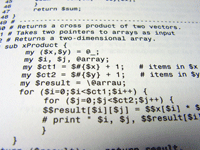|
With XML, your data is stored outside your HTML.
When HTML is used to display data, the data is stored inside your HTML.
With XML, data can be stored in separate XML files. This way
you can concentrate on using HTML for data layout and display, and be sure that changes in the underlying data will not
require any changes to your HTML.
XML data can also be stored inside HTML pages as "Data Islands".
You can still concentrate on using HTML only for
formatting and displaying the data.
XML is used to Exchange Data
With XML, data can be exchanged between incompatible systems.
In the real world, computer systems and databases contain data in incompatible formats. One of the
most time-consuming
challenges for developers has been to exchange data between such systems over the Internet.
Converting the data to
XML can greatly reduce this complexity and create data that can be read by many different types of applications.
XML and B2B
With XML, financial information can be exchanged over the Internet.
Expect to see a lot about XML and B2B (Business To Business) in the near
future.
XML is going to be the main language for exchanging financial
information between businesses over the Internet. A lot of interesting B2B
applications are under development.
XML can be used to Share Data
With XML, plain text files can be used to share data.
Since XML data is stored in plain text format, XML provides a software- and
hardware-independent way of sharing data.
This makes it much easier to create
data that different applications can work with. It also makes
it easier to expand or upgrade a system to new operating systems, servers,
applications, and new browsers.
XML can be used to Store Data
With XML, plain text files can be used to store data.
XML can also be used to store data in files or in databases. Applications can
be written to store and retrieve information from the store, and generic
applications can be used to display the data.
XML can make your Data more Useful
With XML, your data is available to more users.
Since XML is independent of hardware, software and application, you can make
your data available to other than only standard HTML browsers.
Other clients and
applications can access your XML files as data sources, like they are accessing
databases. Your data can be made available to all kinds of "reading
machines" (agents), and it is easier to make your data available for blind
people, or people with other disabilities.
XML can be used to Create new Languages
XML is the mother of WAP and WML.
The Wireless Markup Language (WML), used to markup Internet applications for
handheld devices like mobile phones, is written in XML.
You can read more about WML in our WML tutorial.
If Developers have Sense
If they DO have sense, all future applications will exchange their data in
XML.
The future might give us word processors, spreadsheet
applications and databases that can read each other's data in a pure text format,
without any conversion utilities in between.
We can only pray that Microsoft and all the other software vendors will
agree.
|


